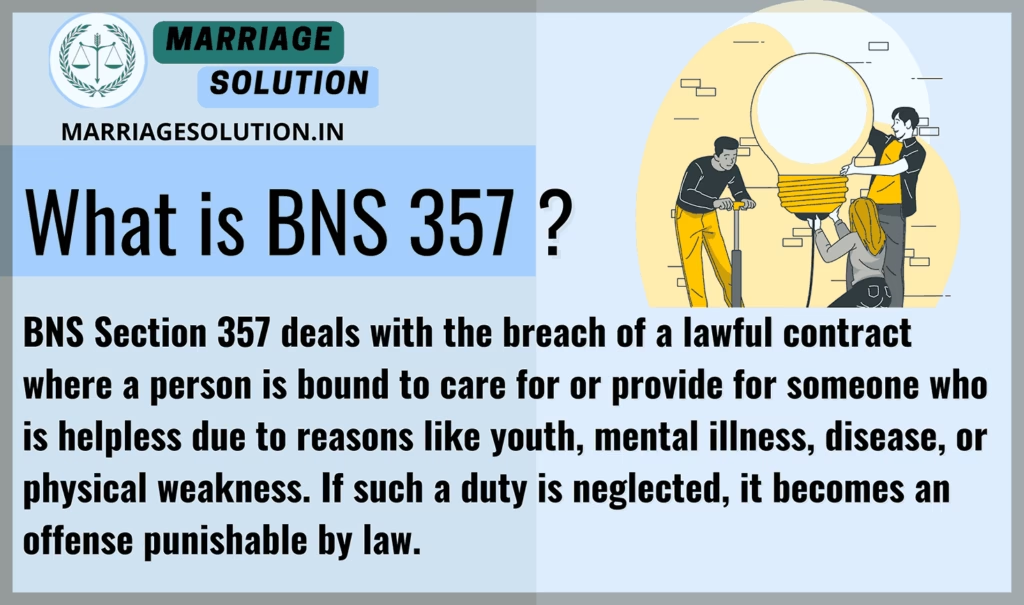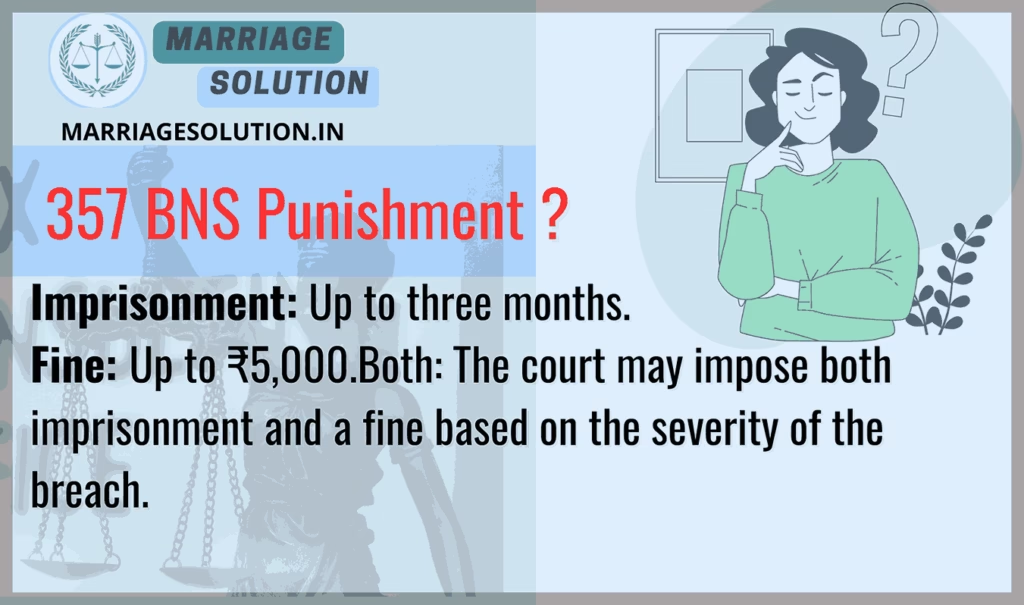Introduction of 357 BNS
357 BNS of the Bharatiya Nyaya Sanhita focuses on protecting helpless individuals by penalizing the breach of lawful contracts meant for their care. It applies to situations where a person is legally bound to look after someone who is incapable of taking care of themselves due to age, illness, mental unsoundness, or disability. By replacing IPC Section 491, this provision strengthens accountability by ensuring that caregivers or guardians fulfill their duties. The law reflects both a legal and moral responsibility, ensuring that vulnerable people such as children, the elderly, or disabled individuals are not left neglected or without essential support.
The Bharatiya Nyaya Sanhita (BNS) Section 357 replaces the old Indian Penal Code (IPC) Section 491.
What is BNS Section 357 ?
BNS Section 357 deals with the breach of a lawful contract where a person is bound to care for or provide for someone who is helpless due to reasons like youth, mental illness, disease, or physical weakness. If such a duty is neglected, it becomes an offense punishable by law.

BNS 357 in Simple Points
“Whoever, being bound by a lawful contract to attend to or supply the needs of ahelpless person, such as a child, mentally ill person, or one suffering from illness or disability, and fails to do so, shall be punished with imprisonment up to three months, or with a fine up to ₹5,000, or with both.”
1. Meaning of Breach of Contract to Care for Helpless Persons
- A helpless person is someone who cannot take care of themselves due to:
- Youth (e.g., a child).
- Mental illness or unsoundness of mind.
- Physical weakness or disease.
- Breach of contract means failing to perform a duty that one has legally agreed to do under a contract.
Example: A caretaker hired to provide food and medicines to a bedridden person neglects the duty and leaves them unattended.
2. Essential Ingredients of the Offense
For this offense to be made out, the following must be proved:
- There exists a lawful contract between the caregiver and the helpless person (or their guardian).
- The accused was bound to attend or provide care under the contract.
- The person in need was helpless due to age, illness, or disability.
- The accused failed to fulfill the duty intentionally or negligently.
Without these conditions, negligence or casual mistakes may not amount to a criminal offense.
3. Punishment under BNS Section 357
- Imprisonment: Simple imprisonment up to 3 months.
- Fine: Up to ₹5,000.
- Both: Depending on the seriousness, both imprisonment and fine can be imposed.
The punishment ensures accountability but is relatively lighter compared to other sections, as this is a breach of civil duty with criminal liability attached.
4. Nature of the Offense
- Bailable → The accused has the right to get bail.
- Non-Cognizable → Police cannot arrest without prior approval of a Magistrate.
- Non-Compoundable → The case cannot be settled by private compromise; it must go through legal proceedings.
- Trial By → Any Magistrate can try the case.
5. Examples of BNS Section 357 in Action
- Example 1 – Caregiver Neglect:
A nurse employed to care for a paralyzed patient refuses to provide food and medicine despite being paid. This is a punishable breach under Section 357. - Example 2 – Child Neglect:
A school caretaker contracted to look after small children neglects them during school hours, causing harm. This is also an offense under Section 357. - Example 3 – Not an Offense:
If a guardian is unable to provide care due to sudden illness or unavoidable emergency (without intention to neglect), it may not be punishable.
Importance of Section 357
- Protects helpless individuals from neglect.
- Holds caregivers accountable for their duties.
- Reinforces moral and social responsibility.
- Acts as a safeguard for vulnerable groups like children, elderly, and disabled persons.
Section 357 BNS Overview
Under BNS Section 357, any person bound by a lawful contract to care for or provide for a helpless individual who, due to age, illness, or disability, cannot care for themselves, and who willfully neglects this duty, is committing an offense punishable under this law.
Key Points with Detailed Explanations
- Obligation Under Lawful Contract
- The section applies to those who are legally bound by a contract to provide care or fulfill the needs of a helpless person.
- For example, a caregiver or nurse hired to attend to an elderly person must fulfill their duties.
- This responsibility is enforceable by law, ensuring the safety and well-being of those who cannot care for themselves.
- Failure to fulfill this obligation is considered a breach of trust and is punishable.
- Definition of a Helpless Person
- A helpless person includes individuals who are:
- Young (e.g., children who cannot fend for themselves).
- Mentally ill or suffering from unsoundness of mind.
- Physically weak or suffering from a debilitating disease.
- The law protects those who cannot ensure their own safety or meet their basic needs.
- A helpless person includes individuals who are:
- Acts Considered as Neglect
- Voluntary omission to provide care or fulfill needs as agreed in the contract is considered neglect.
- For instance, a nurse neglecting a bedridden patient’s health needs breaches this section.
- The law sees this as both a moral and legal failure to uphold the contract.
- Punishment for the Offense
- The punishment includes:
- Imprisonment of up to three months, or
- Fine of up to ₹5,000, or
- Both imprisonment and fine.
- This ensures accountability for individuals tasked with caring for vulnerable people.
- The punishment includes:
- Bailable and Non-Cognizable Offense
- The offense under this section is bailable, meaning the accused can secure bail.
- It is also non-cognizable, which means the police cannot arrest the accused without a magistrate’s permission.
- This classification emphasizes the civil nature of the breach.
- Non-Compoundable Nature
- The offense is non-compoundable, meaning it cannot be settled or withdrawn through mutual agreement between the parties.
- This ensures that justice is served and the helpless person’s rights are protected.
- Trial by Magistrate
- Cases under this section are triable by any magistrate.
- This allows accessibility to justice and ensures that such cases are resolved quickly.
- Magistrates have the authority to impose imprisonment, fines, or both as punishment.
- Moral Responsibility of Caregivers
- Beyond legal obligations, this section highlights the moral duty to care for those unable to fend for themselves.
- The law safeguards vulnerable groups by holding caregivers accountable.
- This principle upholds societal values of compassion and responsibility.
- Examples of Breach
- A teacher neglecting the care of a mentally challenged student they are hired to assist.
- A caretaker failing to provide food and medicine to a bedridden patient under their care.
- Such breaches, if proven, attract penalties under this section.
- Protection for Helpless Individuals
- The primary aim of this section is to protect the rights of individuals who depend on others.
- It ensures that caregivers fulfill their obligations, maintaining the dignity and well-being of helpless individuals.
- This protection extends to children, the elderly, and individuals with disabilities or illnesses.
Two Examples of BNS Section 357
- Neglect by a Caregiver:
- A nurse hired to take care of an elderly patient with physical disabilities fails to provide prescribed medications or proper meals, leaving the patient in a vulnerable state. This breach of duty falls under BNS Section 357.
- Failure to Assist a Mentally Ill Individual:
- A guardian legally responsible for a mentally ill person’s care ignores their basic needs, such as hygiene and food, resulting in harm or distress. This neglect is punishable under this section.
BNS 357 Punishment
Imprisonment: Up to three months.
Fine: Up to ₹5,000.Both: The court may impose both imprisonment and a fine based on the severity of the breach.

BNS 357 bailable or not ?
Bailable: The offense under BNS Section 357 is bailable, meaning the accused has the right to seek bail and secure release during the trial.
Comparison: BNS Section 357 vs IPC Section 491
| Section | Offense | Punishment | Bailable / Non-Bailable | Cognizable / Non-Cognizable | Trial By |
|---|---|---|---|---|---|
| BNS Section 357 | Breach of lawful contract to care for helpless individuals due to youth, illness, mental unsoundness, or disability. | Imprisonment up to 3 months, or fine up to ₹5,000, or both. | Bailable | Non-Cognizable | Any Magistrate |
| IPC Section 491 (Old) | Breach of contract to attend on and supply wants of helpless person bound by law. |
Imprisonment up to 3 months, or fine up to ₹200, or both. (Fine amount much lower compared to BNS 357). |
Bailable | Non-Cognizable | Any Magistrate |
BNS Section 357 FAQs
1. What is the primary objective of BNS Section 357?
The section aims to ensure that people legally bound to care for helpless individuals fulfill their duties, protecting vulnerable groups from neglect.
2. Who is considered a helpless person under this BNS Section 357?
Helpless individuals include children, mentally ill persons, or those physically weak or suffering from severe diseases, who cannot care for themselves.
3. What is the punishment for breaching this BNS 357?
The punishment can be imprisonment for up to three months, a fine of ₹5,000, or both, depending on the severity of the breach.
4. BNS 357 is the offense bailable?
Yes, the offense is bailable, allowing the accused to apply for bail during the legal proceedings.
5. Can the BNS 357 offense be settled between the parties?
No, it is non-compoundable, meaning it cannot be resolved through mutual settlement or compromise.
Conclusion
BNS Section 357 is an important safeguard that upholds the dignity and protection of helpless individuals. By criminalizing the neglect of lawful caregiving duties, the section ensures that caregivers remain accountable and responsible. With penalties including imprisonment, fines, and the possibility of both, the law strikes a balance between deterrence and fairness. Compared to IPC Section 491, it introduces stricter financial penalties, reflecting modern concerns for vulnerable individuals’ well-being. This section reinforces compassion, responsibility, and justice, making sure that no helpless person is deprived of basic care due to neglect.
Need Legal Support?
If you are dealing with court cases, marriage problems, or any other legal issue, our team at Marriage Solution – Lawyer Help is here for you. Simply fill out our quick online enquiry form, and we’ll connect you with the right legal expert to support your needs.
Finished with BNS 357 ? Continue exploring the next provisions of the Bharatiya Nyaya Sanhita (BNS), 2023. Each section includes explanations, examples, and plain-language breakdowns for easy understanding.
Chapter XX – Repeal And Savings.
- 358 BNS : Repeal and savings .
- https://marriagesolution.in/bns_section/358-bns/
Full IPC Section List: https://marriagesolution.in/ipc-section-list
All Indian Law & Blogs: https://marriagesolution.in/indian-law/
Full BNSS Section List: https://marriagesolution.in/bnss_section-list
